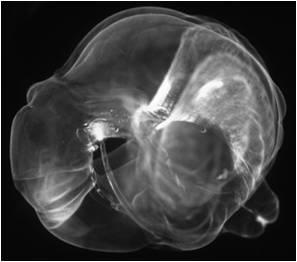Oikopleura
The planktonic animal is a tunicate, the closest extant group to vertebrates. It has a vital role in marine ecosystems, forming part of a group that is the second most abundant component of zooplankton.
Main content
The house with in which the animal lives is repetitively synthesized and discarded (every 4 h), with discarded houses representing a significant contribution to global vertical carbon flux in the oceans. Despite being a complex chordate, the animal has an extremely compact, sequenced genome of only 70Mb, smaller than that of the nematode C. elegans and only 2.5% the size of the human genome.
We study the molecular developmental biology of this organism and its molecular ecology. Areas of interest include the molecular control of endoreduplicative cell cycle variants that the animal has mastered in its strategy of very rapid growth and chromatin dynamics related to gene expression in a very compact gene regulatory landscape. We also investigate how this group of plankton is likely to respond to predicted changes in ocean temperature and acidity through a combination of laboratory, mesocosm and field studies. In a broader sense we contribute to the development of molecular tools aimed at exploring marine ecosystem interactions and health.
